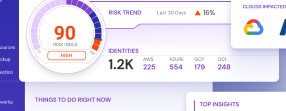Powerful Cloud Permissions You Should Know
Mapping Permissions to the MITRE Framework

1
Quantifying Cloud Access Risk: Overprivileged Identities and Zombie Identities
We analyzed a sample of public cloud enterprises and aggregated their data together. On average, their cloud estate comprised 11,290 identities, 19% of which were humans and 81% were machine identities.
92%
of the Permissions Attack Surface is Caused by Excessive Permissions
-
87%
87% attributed to unused sensitive permissions by machine identities
-
13%
13% attributed to unused sensitive permissions by human identities
On average, 92% of all identities with access to sensitive permissions did not use them over 90 days. These identities are given access to powerful permissions they don’t need – the ones that could cause the most harm in your environment. This unnecessarily increases the exploitable attack surface in your cloud.
61%
of identities are unused (zombies)
-
88%
88% attributed to zombie machine identities
-
12%
12% attributed to zombie human identities
Identities are created for third-parties, temporary projects, and testing, but sometimes get left behind and forgotten about. These identities are ripe for exploitation, yet serve no active purpose.
2
How Cloud Teams Tackled this Problem
With such an insurmountable attack surface created by unused access and permissions, enterprises sought a way to reduce their risk quickly and with less operational overhead. These enterprises deployed the Sonrai Cloud Permissions Firewall for the job.
With a sweeping global deny policy, unused sensitive permissions are restricted, unused services and regions are locked down, and zombie identities are quarantined from use. Actively used permissions are included in an exempt list so your operations are not disrupted. Any new identities are fully protected with a default deny structure.
Future access needs are seamlessly granted with a permissions on demand workflow integrated into a preferred ChatOps tool. See the results below.
“Our transition from tedious, weeks-long tasks to accomplishing Least Privilege outcomes in just a few days has been remarkable. This approach has saved us a tremendous amount of time while also guaranteeing the security of all critical permissions."

Josh McLean, CIO of World Kinect

“The thing about deleting unused identities or enforcing least privilege is we know it's the ‘right’ thing to do, but everyone’s afraid it’ll break something or interrupt our development cycles. We don’t have to worry anymore. The assurance the Cloud Permissions Firewall brings us that nothing that’s needed is taken and there will be zero interruption has eliminated our hesitations. Now we just deploy – confidently.”

Preetam Sirur, CISO, Eye Care Leaders

What’s the ROI for Cloud Permissions Firewall?
Discover how you can get to least privilege in 5 days while saving your business money.
Explore ROI3
Cloud Permissions Firewall Does Not Disrupt DevOps
After protections are in place, permission exceptions can be made to provide on-the-fly access. When an identity tries to use a restricted sensitive permission or access a service, a request workflow is kicked off and sent to a relevant approver. This entire process takes minutes.
6
Permissions-on-Demand workflows in 90 days
On average an enterprise organization will have six on-demand requests for access to restricted sensitive permissions or to “wake up” a zombie identity. The minimal disruption and infrequent requests are made possible by the fact that original restrictions are based on activity and usage monitoring so nothing that is needed is taken. Future requests only occur when there is new use of sensitive permissions or a zombie identity. Any non-sensitive permission usage does not require a permissions on demand workflow.
4
Cloud Permissions Firewall Automatically Protects an Evolving Cloud
100%
of new identities created in the last 90 days were protected with default deny.
New identities are created every day and they’re given access they don't need. This means more overprivileged identities that your teams would need to manually bring to least privilege. With Cloud Permissions Firewall, the global deny policy enforces a default deny – meaning, new identities created under it will automatically be restricted from sensitive permissions.

Secure Sensitive Permissions and Access
The Sonrai Cloud Permissions Firewall takes instant action to protect excessive sensitive permissions and secure unused services, regions, and identities. There is zero disruption to development. See it for yourself below.

© 2025 Sonrai Security. All rights reserved
Sonrai cloud security platform, products and services are covered by U.S. Patent Nos. 10,728,307, 11,134,085, and 12,218,982, together with other domestic and international patents pending. All rights reserved.

